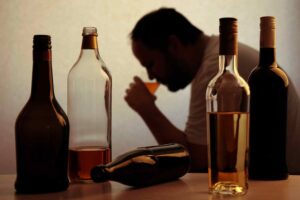Living with bipolar disorder presents its own set of challenges, from navigating mood swings to managing relationships and maintaining stability in daily life. Adding alcohol into the mix can complicate matters further, creating a tangled web of potential triggers, risks, and coping mechanisms. In this blog, we delve into the intricate relationship between bipolar disorder and alcohol, exploring how they intersect, the potential consequences of their coexistence, and strategies for effectively managing both.
Contents
What Does Alcohol Do To a Bipolar Person?
 Alcohol can have significant effects on a person with bipolar disorder, both in the short term and the long term. Here are some ways alcohol can impact someone with bipolar disorder:
Alcohol can have significant effects on a person with bipolar disorder, both in the short term and the long term. Here are some ways alcohol can impact someone with bipolar disorder:
- Mood Swings: Alcohol can exacerbate mood swings, leading to more frequent and intense episodes of mania or depression. It can also disrupt the stability that individuals with bipolar disorder work hard to maintain.
- Increased Risk of Episodes: Alcohol can act as a trigger for mood episodes in people with bipolar disorder. This means that drinking alcohol may increase the likelihood of experiencing a manic or depressive episode.
- Medication Interactions: Many medications used to treat bipolar disorder can interact with alcohol, potentially reducing their effectiveness or causing harmful side effects. For example, alcohol can amplify the sedative effects of certain medications, leading to drowsiness, dizziness, or impaired coordination.
- Impaired Judgment and Decision Making: Alcohol can impair judgment and decision-making abilities. This can be particularly problematic for individuals with bipolar disorder who may already struggle with impulsivity during manic episodes.
- Sleep Disruption: Alcohol can disrupt sleep patterns, leading to insomnia or poor sleep quality. Sleep disturbances are common in bipolar disorder and can exacerbate mood symptoms.
- Increased Risky Behavior: People with bipolar disorder may be more prone to engaging in risky behaviors, such as excessive drinking or substance abuse, during manic episodes. Alcohol can lower inhibitions and increase the likelihood of engaging in impulsive or dangerous behaviors.
- Worsening of Co-occurring Disorders: Many individuals with bipolar disorder also experience co-occurring disorders such as anxiety or substance abuse. Alcohol use can worsen symptoms of these disorders and complicate treatment.
Overall, alcohol can have a detrimental impact on the course and management of bipolar disorder. It’s essential for individuals to be mindful of the effects of alcohol and to work with healthcare providers to develop strategies for minimizing its risks.
How Is Bipolar Disorder And Alcohol Addiction Related?
Both are related in several ways, and their relationship can be complex and multifaceted:
- Self-Medication
Some individuals with bipolar disorder may turn to alcohol as a form of self-medication to alleviate symptoms of depression, anxiety, or mania. They may use alcohol to temporarily numb or escape from distressing mood symptoms.
- Increased Vulnerability
People with bipolar disorder may be more vulnerable to developing alcohol use disorder (AUD) than the general population. The presence of bipolar disorder can increase the risk of developing problematic drinking patterns due to factors such as impulsivity during manic episodes or attempts to self-medicate mood symptoms.
- Trigger for Mood Episodes
Alcohol can act as a trigger for mood episodes in individuals with bipolar disorder. Both manic and depressive episodes may be precipitated or exacerbated by alcohol consumption. For example, alcohol use during a manic episode may intensify symptoms of euphoria, impulsivity, and irritability, while alcohol use during a depressive episode may worsen feelings of sadness, hopelessness, and lethargy.
- Interference with Treatment
Alcohol use can interfere with the effectiveness of treatment for bipolar disorder. It may diminish the efficacy of mood-stabilizing medications or antidepressants, making it more challenging to achieve mood stability.
- Impact on Sleep and Daily Functioning
Alcohol can disrupt sleep patterns, which is particularly problematic for individuals with bipolar disorder who may already struggle with sleep disturbances. Poor sleep quality can exacerbate mood symptoms and impair daily functioning.
Overall, the relationship between bipolar disorder and alcohol is complex and bidirectional. Recognizing and addressing this relationship is crucial for the effective management and treatment of both conditions.
What Are The Risks With Bipolar And Alcohol Together?
 The combination of bipolar disorder and alcohol can pose several risks, both in the short term and the long term.
The combination of bipolar disorder and alcohol can pose several risks, both in the short term and the long term.
Risks
Some of these risks include:
Triggering Mood Episodes
Alcohol consumption can act as a trigger for mood episodes in people with bipolar disorder. Drinking alcohol during a manic episode may intensify symptoms of impulsivity, agitation, and risk-taking behavior. Conversely, alcohol use during a depressive episode may worsen feelings of sadness, hopelessness, and lethargy.
Impaired Judgment and Decision Making
Alcohol can impair judgment and decision-making abilities, which can be particularly problematic for individuals with bipolar disorder who may already struggle with impulsivity during manic episodes. This impaired judgment can lead to risky behaviors, such as excessive drinking, substance abuse, or engaging in unsafe activities.
Increased Risk of Suicide
Both are associated with an increased risk of suicidal thoughts and behaviors. The combination of the two disorders can further elevate this risk, especially during periods of acute mood instability or crisis.
Physical Health Complications
Chronic alcohol abuse can lead to a range of physical health complications, including liver disease, cardiovascular problems, gastrointestinal issues, and neurological damage. These health problems can exacerbate the challenges of managing bipolar disorder and may complicate treatment.
Social and Interpersonal Problems
Co-occurring bipolar disorder and alcohol use disorder can strain relationships with family, friends, and colleagues. Alcohol-related behavior, such as mood swings, aggression, or withdrawal, can negatively impact social interactions and lead to isolation or conflict.
Legal and Financial Consequences
Problematic alcohol use can lead to legal problems, such as DUI (driving under the influence) charges or legal issues related to substance abuse. Additionally, the financial burden of alcohol abuse, including spending money on alcohol and the potential loss of income due to employment difficulties, can further exacerbate stress and instability in individuals with bipolar disorder.
Overall, the risks associated with both conditon together underscore the importance of addressing both conditions comprehensively in treatment planning and management. Individuals with bipolar disorder need to be aware of the potential consequences of alcohol use.
How To Deal With Bipolar Disorder And Alcohol?
 Dealing with bipolar disorder and alcohol requires a comprehensive approach that addresses both conditions simultaneously. Here are some strategies to help:
Dealing with bipolar disorder and alcohol requires a comprehensive approach that addresses both conditions simultaneously. Here are some strategies to help:
Seek Professional Help
If you or someone you know is struggling with bipolar disorder and alcohol use, it’s essential to seek professional help from a healthcare provider experienced in treating dual diagnosis. A psychiatrist, psychologist, or addiction specialist can provide an accurate diagnosis, develop an individualized treatment plan, and offer ongoing support.
Medication Management
Medications are often a cornerstone of treatment for bipolar disorder. It’s crucial to take prescribed medications as directed by a healthcare provider and to avoid alcohol. This can interfere with the effectiveness of mood-stabilizing medications, antidepressants, or antipsychotics. Be open and honest with your healthcare provider about your alcohol use to ensure appropriate medication management.
Therapy and Counseling
Psychotherapy, such as cognitive-behavioral therapy (CBT) or dialectical behavior therapy (DBT), can be beneficial for managing both bipolar disorder and alcohol use. Therapy can help individuals develop coping skills, identify triggers and high-risk situations, and learn healthier ways of managing emotions and stress.
Support Groups
Joining a support group for individuals with bipolar disorder or alcohol use disorder can provide valuable peer support, encouragement, and understanding. Support groups offer a safe space to share experiences, learn from others, and access practical tips for managing both conditions.
Healthy Lifestyle Choices
Adopting healthy lifestyle habits can support overall well-being and help manage symptoms of bipolar disorder and alcohol use disorder. This includes getting regular exercise, eating a balanced diet, prioritizing sleep hygiene, and reducing stress through relaxation techniques such as mindfulness or meditation.
Avoid Triggers
Identify and avoid triggers that may contribute to alcohol use or exacerbate symptoms of bipolar disorder. This may include social situations where alcohol is present, certain people or environments that promote substance use, or stressors that trigger mood episodes.
Develop Coping Strategies
Develop alternative coping strategies for managing stress, anxiety, and mood symptoms without relying on alcohol. This may involve practicing relaxation techniques, engaging in hobbies or activities that bring joy, seeking social support, or using distraction techniques during cravings.
Create a Supportive Environment
Surround yourself with supportive friends and family members who understand your challenges and can provide encouragement and assistance when needed. Educate loved ones about the condition to foster empathy, reduce stigma, and promote a supportive environment for recovery.
Remember that managing both conditions is a process, and it’s okay to ask for help and support along the way. With the right treatment, support, and coping strategies, it is possible to lead a fulfilling life while effectively managing both conditions.
Conclusion
In conclusion, navigating the intersection of bipolar disorder and alcohol presents significant challenges, but with the right support and strategies, it is possible to manage both conditions effectively. It’s crucial to seek professional help, follow medication and therapy recommendations, and develop healthy coping mechanisms.
Remember, recovery is a journey, and it’s okay to seek help and support along the way. By prioritizing mental and physical health and staying proactive in managing both conditions, individuals can work towards a brighter, more fulfilling future.
